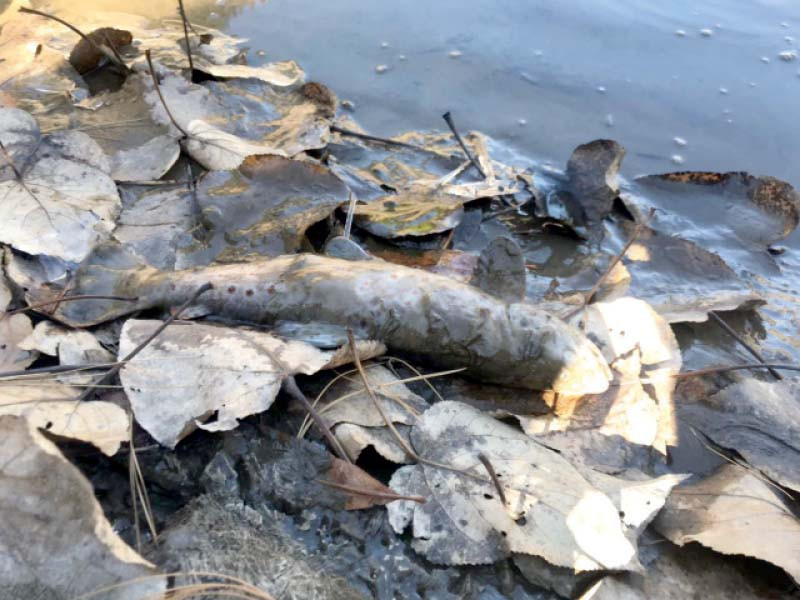Expert says evidence of fungal, bacterial infections has been found in diseased fish

River Kunhar, a former pristine freshwater body and home to the famed trout fish, is fast losing its value as an ideal abode for cold-water dwelling fish due to increasing plastic pollution.
The pollution is also adversely affecting the health of trout, with the fish suffering from a fungal disease and hundreds of them dying daily.
It is feared that if no measures are taken to put a stop to the hazardous pollution, it may cause the eventual extinction of trout from the waters of River Kunhar.
Tourists visiting Kaghan Valley every year are considered the major culprits behind the current state of the river, as most of them are seen dumping tonnes of trash indiscriminately in Kunhar and unwittingly causing an exponential rise in plastic waste in the waters.
An awareness campaign has been organised to eradicate plastic pollution from River Kunhar on the guidelines of the Race for Oceans Foundation, of which Pakistan is a member.
A few months back, businessmen owning trout fish farms had reported heavy losses because of a similar disease infecting the fish. Now, the trout in River Kunhar itself are victims of the malady, with recent reports emerging about the unnatural death of hundreds of these species.
Kaghan Development Authority (KDA) Chairman Dr Aimal Zaman said that as soon as they started receiving reports about the occurrence, a special team from the Punjab Department of Fisheries was called to Naran.
The team under Punjab fishery director Dr Zahid Sharif Chaudhary examined both sick and dead specimen of trout and have issued instructions about their treatment.
“Evidence of fungal and bacterial infections has been found in the diseased fish, for which treatment has already begun,” said Dr Zahid. “The fish have started to recover, and we hope that in a few days, we will be able to bring this disease under control.”
Meanwhile, Punjab Fisheries Deputy Director and a principle chemist from Lahore, both well-versed in more than hundreds of diseases in fish, have endorsed Dr Zahid’s statement. They said that timely action by the KDA chairman has managed to prevent a bigger scale of destruction, and that the fish are responding well to their treatment.
They termed the disease a common one, and assured The Express Tribune that the situation is not an alarming one.
Despite repeated attempts, Mansehra district’s Department of Fisheries Director Faheem Ahmed remained unavailable for comment on the situation.
Peshawar also from a plastic waste problem, which is exacerbated due to a lack of concern by residents and environmental protection authorities alike.
It can take up to 300 years for a plastic bottle and 500 years for a plastic bag to decompose, as per a World Wildlife Fund Pakistan (WWF) report. This is problematic in KP’s context as according to the Water Sanitation Service Company Peshawar (WSSP), out of the around 1,500 tons of waste collected every day from the city, 70% is plastic waste whereas the remainder 30% is organic waste – which makes it 1,050 tons of plastic waste per day.
“Despite the provincial government recently passing a bill called K-P Environmental Protection (Amendment) Bill 2022, which imposes a ban on plastic products, residents have not decreased their reliance on plastic,” the spokesperson for WSSP said. He further informed that the WSSP had tried to create awareness amongst people regarding the harmful effects that plastic has on the environment but to no avail.
“We are targeting students now and with the support of other stakeholders we wish to educate people about the proper disposal of plastic waste,” informed Hassan, adding that presently people did not care much that plastic chokes our drainage system and is a death sentence for marine life. Professor Dr Bushra Khan, of the Environmental Science Department at the University of Peshawar, said that it was true that people do not realise that plastic affects our marine life and agricultural lands. “It is no secret that our plastic waste ends up in rivers, which pollutes the water and puts marine life at risk. In K-P alone there has been a decline in the production of 46% of species of fish,” said Dr Bushra, adding that 12 rivers connected K-P and marine life in all was under threat.
“Moreover, our drinking water is also being polluted by the plastic waste; consumption of which can lead to diseases like cancer.” Director of the provincial Environmental Protection Agency (EPA), Anwer Khan, when asked about the lack of implementation of laws passed to ensure a clean environment, replied that the implementation phase would begin soon.
“The bill passed by the K-P assembly regarding the ban on plastic states that implementation will start after 6 months. Since the bill was passed in August 2022, we will start implementing it in January or February of the upcoming year. In this regard, we have already spoken with businessmen related to the plastic industry,” the provincial EPA Director said.
